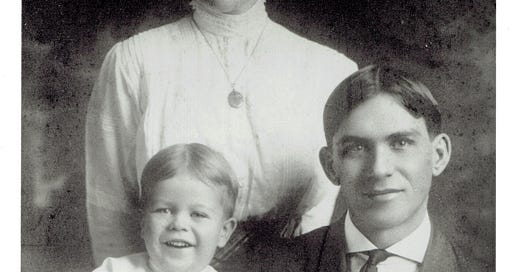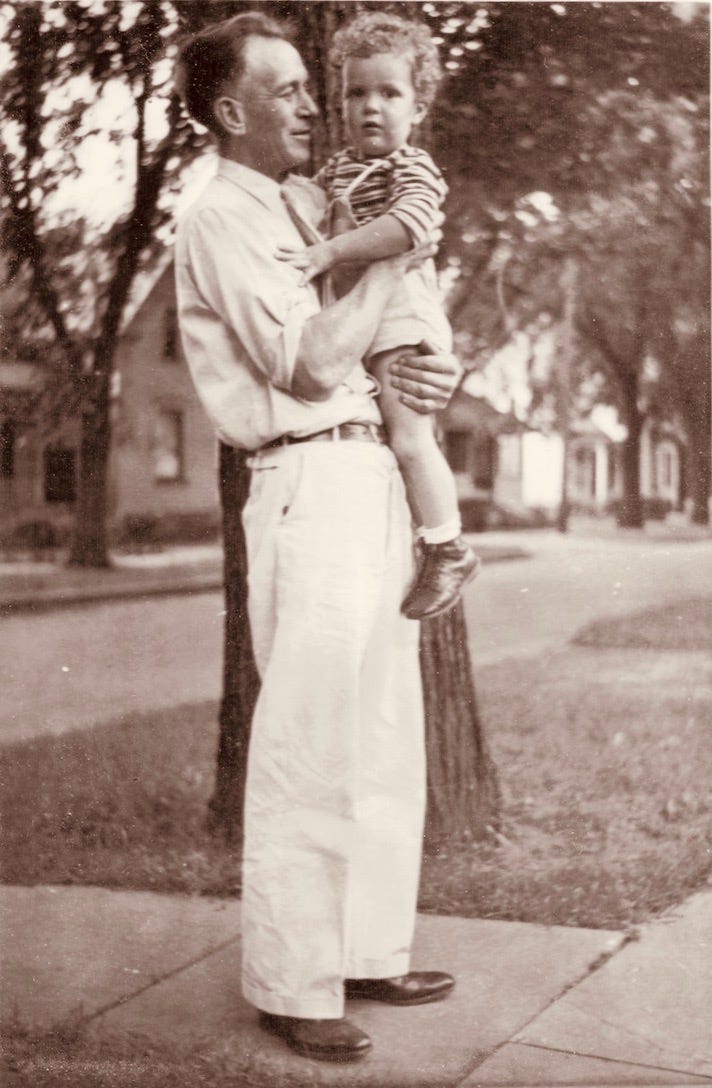A Father's Day Meditation on Greatness
When we get it wrong about what makes for greatness, we get into trouble…
[This weekend: (1) A weak POTUS, our would-be tyrant, will flex U.S. military muscle in D.C. and Los Angeles, trying to look powerful, “justify” more unlawful power grabs by provoking violence, and promote MAGA’s white nationalist agenda. Once again, the world will recoil at the scowling face of The Ugly American. (2) Meanwhile, We the People will take to the streets on “No Kings Day” to reveal the face of democracy in action. (3) Sunday is Father’s Day. I’m glad for this chance to celebrate my father and grandfather, sharing the faces of two men who lived by values MAGA disdains and we must reclaim.]
For years, I’ve been hearing folks say we need to put a “great businessman” in the White House so we can get the U.S.A. on track toward “greatness.” That’s not working out very well, and I know why: (1) the U.S. is a democracy, not a business, and (2) we’ve become deeply confused about what constitutes greatness. A great country is never run like a for-profit business, and the POTUS we’ve got was never a great businessman. A great huckster, con man, mobster or tin-pot dictator maybe, but not a great businessman. Multiple failed and fraudulent businesses, frequent declarations of bankruptcy, and an army of lawyers to wear down people who take you to court do not make for greatness in business.
I know this because my father was a truly great businessman. Max J. Palmer (1912-1994) was a blue collar kid from Waterloo, Iowa. That’s him in the photo above, at age two. With him are his father, Jesse Palmer, and mother, Jennie (Parker) Palmer. Back in the day, people often looked grim when they posed for photos. Not so here! Jennie, who worked at the General Store, looks beatific. Jesse, a machine tool operator who made parts for John Deere tractors, has a welcoming smile. And Max is clearly amused by something, as he often was during his 81 years.
At age 20, Dad left Waterloo and went to Chicago with a very thin resume: a high school diploma, a year of bank clerking, and a strong work ethic. The Great Depression was on, and Dad stood in long lines in search of employment. He took a temporary bookkeeping job at a small company that sold fine china and silverware to restaurants, hotels, railroads and airlines. The owner took a shine to him, and over the next sixty years, Dad rose to become head of sales, V.P., President, CEO, owner and chair of the board.
You won’t find my dad on Google, except for his obituary in the Chicago Tribune, but here’s a news flash: greatness has nothing to do with internet fame. The measure of greatness in a businessman is the same as it is in anyone: it’s about living with integrity, doing what you can to give others a helping hand, and serving the common good. There are dozens of stories to show that Dad lived his life this way, but three will do.
• Dad hired a truck driver named “Dusty” Rhodes who’d had a hard childhood and had a hard time holding a job. Dad mentored him into success, but it took time, and there were some bumps along the way: speeding tickets, late or mistaken deliveries, etc. At dinner one night, Dad mentioned another Dusty screw-up. Full of 14 year-old snark I said, “Why don’t you just fire the guy?” Dad put down his silverware and nailed me with a gimlet eye: “But Park, Dusty has a wife and two children. Where else could he find a job to support his family?”
• When I got into my teens, Dad told me he’d instituted an anti-nepotism rule in his company, so I could never work there. No easy street for me. He wanted me to stand on my own two feet and find my own way, so from age 13 onward I worked all summer as a “landscaper” (mower of lawns), caddy, janitor and handyman. Dad also told me this: “When I sell my company, half the value will be in hardware—our office building, warehouse, trucks and inventory. The other half of the will lie in what accountants call ‘goodwill,’ which is built on honesty and integrity. Whatever you end up doing, Park, remember the importance of creating goodwill. Don’t become someone who knows the price of everything and the value of nothing.”
• After Dad’s sudden death in 1994, I picked up a suit he'd left at the dry cleaner. Behind the counter were two women, both in their sixties, whose faces were worn by care. When they saw the claim check with Dad's name on it, one said, “Are you Mr. Palmer's son? We’re so sorry about his passing.” The other said, “We're going to miss your father. Every time he came into the store, he lifted our spirits and made us feel better about life.” Teary-eyed, I said he'd always done the same for me.
The virtues implicit in those three stories, virtues related to love, truth and justice, came naturally to my dad. But none of them can be found in the makeup of the man who now serves as misleader-in-chief of the U.S.A. My question is simple: What happened to the built-in bunk detector for which Americans have long been famous? Why did so many fail to spot POTUS for the con man he is? Even Mad Magazine had his number back in 1992.
I remember the moment when my grandfather, Jesse Palmer, activated my bunk detector. During an end-of-summer visit to Waterloo, the 14-year old version of me walked to a nearby store and bought the harmonica of my dreams with money I’d earned mowing lawns. I ran home, excited to show my prize to Grandpa, who’d spent his day working hard in the machine shop. He held it in his hand, gave it a little shake (it rattled), then blew a few notes on it. Even I could hear how tinny it sounded. Handing the harmonica back to me, Grandpa said, with a smile, “They saw you coming.” He never said another word about it, but in that moment I took a silent oath never to be conned again. Here’s an example from eight months before the 2016 election.
How and why did Americans lose the values and common sense my father and grandfather lived by? Trained as a social scientist, I’ve read a lot of well-researched studies on this question and have yet to find a compelling answer. What I know is this: my dad and my grandparents had an abiding sense of humility, generosity, and love of ordinary life that made it easy for them to spot a fraud. They also had an abiding respect for the democracy that had helped them find their way through the Great Depression and World War II. One more Dad story to bring this Father’s Day meditation to a close:
Because of his charitable work, Dad was elected chair of the board of Chicago’s YMCA Hotel, which served a lot of young men down on their luck. During his tenure, the Black Panthers stayed at the hotel for their national meeting, and a right-wing radio disc jockey attacked the Y for hosting these “traitors.” I remember Dad coming home one night and telling us what he had said to the Board: “The Panthers aren’t trashing the place, or stealing towels, or intimidating anyone. They’re just talking, and they’re paying their bills. This is America, so what’s the problem?”
If my dad knew that the current POTUS had sent a mob to trash the People’s House on January 6, 2021, then pardoned or commuted the sentences of those who were lawfully convicted of the crime, he’d be stunned at what America has become. So I’m here on Father’s Day to tell my dad that his son and millions of other Americans are still walking the path he walked toward a better day—and to thank him for being the best man I’ve ever known.
[NOTES: My 10 books are HERE and HERE. The Center for Courage & Renewal is HERE. I post on Substack every Friday, as time and energy allow. Free as well as paid subscriptions will always have access to everything I post.]








Thank you, Parker, for reminding me what real leadership looks like…humility, service, grace. Your dad and grandfather would be proud!
Parker, I have chills reading this post. Thank you for sharing the lovely family stories and, in the process, reminding us of the goodness and decency that has existed and will continue to exist in the world. We only need to remember and reach for that spirit every day.